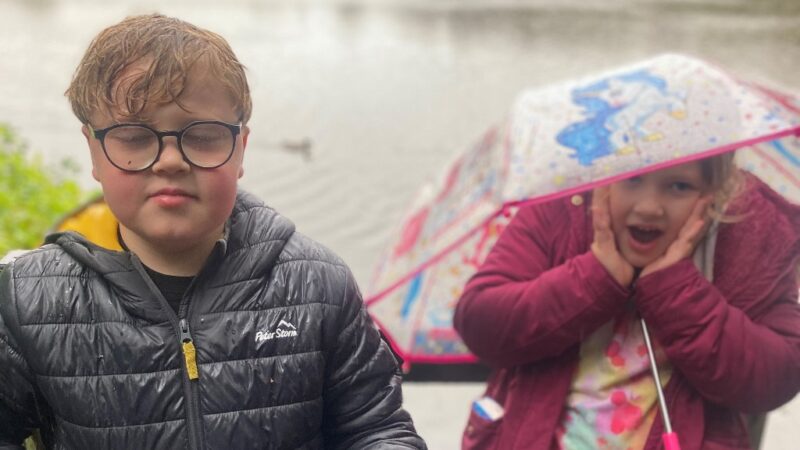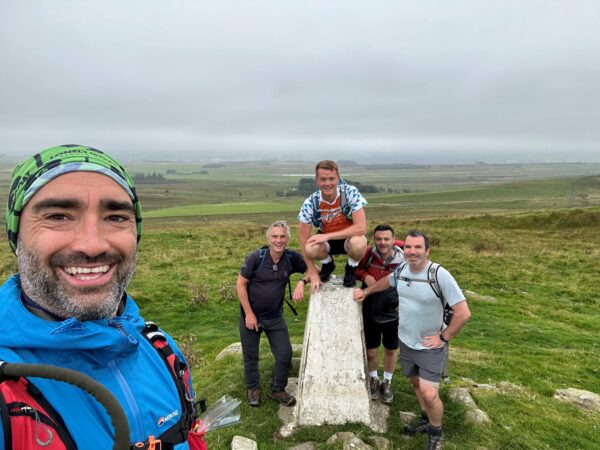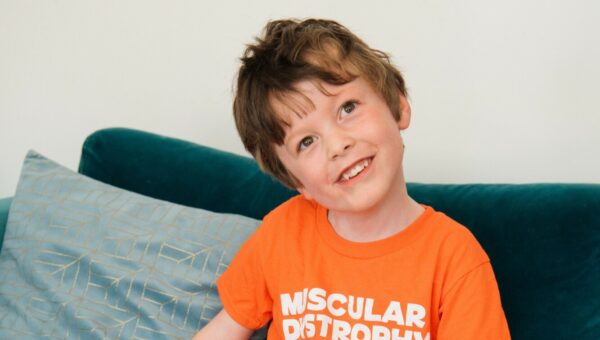Jed Thirkettle is a big believer in enjoying what you have, rather than wishing for the next best thing. Having grown up with muscular dystrophy, Jed’s journey hasn’t been easy, but it’s taught him a lot. At a recent MDUK golf day, Jed shared his story – and his hard-earned wisdom – about the power of living in the moment.
“We spend so much of our lives wishing we were in someone else’s shoes that we often forget to enjoy what we have right now”
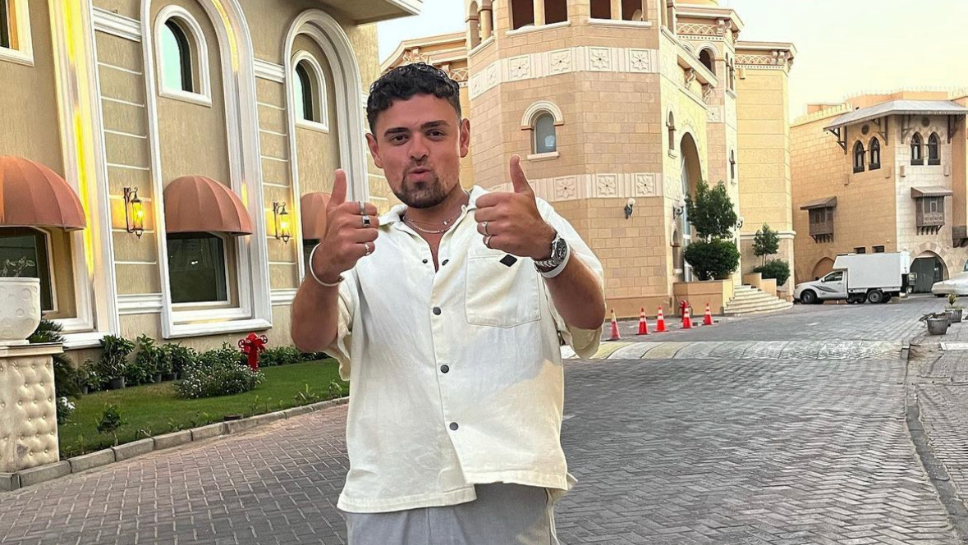
Like most kids growing up in the UK, every year my classmates and I took part in the school sports day. It was the one day of the year that I absolutely dreaded.
All the kids had to do at least one event, and I would always opt for the 75-meter run. It was the shortest event, so I could get it over and done with. And every year, without fail, it would be the most humiliating 20 seconds of my life.
One year, the sports teacher came up to me and asked, “Jed, would you like a head start?”. They offered to let me start the race 20 meters ahead of the other kids. I paused for a moment, then shook my head adamantly.
In my mind, the only thing worse than coming last would be coming last with a head start. But I didn’t want to quit the race, either. I still wanted to compete; but what I really wanted, was to be able to compete on a level playing field with my peers.
Being diagnosed with Ullrich congenital muscular dystrophy at eight-years-old
When I was growing up, I was always noticeably slower, weaker, and less physically developed than the kids in my class.
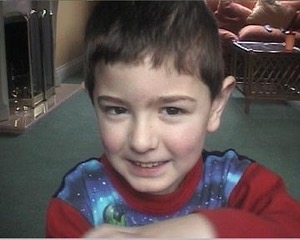
The doctors kept saying that I was just developing slowly and that I’d catch up, but I didn’t. At the age of eight, the doctors recommended a muscle biopsy – that’s when we got the devastating news that I had been diagnosed with Ullrich congenital muscular dystrophy.
Back then, my parents and I were told that we only had a few years until I’d be in a wheelchair. They told us I’d be on a ventilator at aged 14, and I’d be lucky to live past 20. It was overwhelming to hear this devastating news, especially for my parents.
Despite this prognosis, I’m currently doing very well. Going for a long run is pretty much out of the question, but I’m fit, healthy, and active. What’s difficult for me is the day-to-day activities, the little things like going up stairs or getting up and down from the floor quickly.
“I brushed it off but deep down, it got to me”
Struggles like these can have a massive impact on you, mentally. When I’m exercising in the gym, I catch people staring, wondering why a fully-grown man is lifting such light weights.
When I’m struggling up the stairs at the train station, I’ve had people stop and ask, “Have you hurt yourself? What’s wrong with you?”.
I can brush it off in the moment but deep down, I feel embarrassed. I know I shouldn’t be but sometimes, that stuff just gets to you. I may be a mature grown-up (although my dad might have something to say about that!) but comments like this still hurt. People just have no idea the effects these throw-away comments can have on someone.
It’s like the world is always trying to remind you about the condition you’re living with day to day and how it’s not “normal”.
“Raise your hand if you spent the morning worrying how you’d climb the front steps into this building”
I recently spoke at one of MDUK’s Golf Days to support their fundraising efforts and provide insight into living with a muscle-wasting condition, helping guests to understand more about muscular dystrophy.
Towards the end of my speech, I asked everyone in the room to raise their hands if they had a “dream car”. It didn’t matter whether they already owned it or if they were dreaming of owning it one day. A lot of people put their hands up.
Then, I asked people to raise their hands (or keep them raised) if they had a “dream house”; a home they’d love to own one day, or might never be able to realistically afford. More hands went up.
Finally, I asked people to keep their hands raised if they spent the whole morning worrying about the number of steps they’d need to climb to get into the golf club. Everyone’s hands went down. All except mine.
When you’re fixated on what you haven’t got yet, you don’t get to enjoy the moment you’re in now.
As I went on to explain, the point I was trying to make is that as a society, we spend a lot of time wishing for the next best thing. We wish for the bigger house, the nicer car, a fancy holiday.
It’s a mindset I’m very familiar with. I spent 22 years wishing that I could be stronger, faster, bigger, and more muscular. But it’s just not a healthy way to live. When you’re fixated on what you haven’t got yet, you don’t get to enjoy the moment you’re in now.
I’ve finally come to terms with that, which is why I try to focus on the here and now – and do all I can today to help people in my position.
Raising money for MDUK through Team Jed
MDUK has helped support my parents and I massively with our fundraising efforts.
To help drum up more support, we set up Team Jed through MDUK’s family fund scheme. The charity also helps us organise and run the Pedal Paddle Peak Challenge; a popular fundraising event based in the Lake District that my dad, Michael established. Over the years we’ve helped raise over £200,000 to support MDUK.
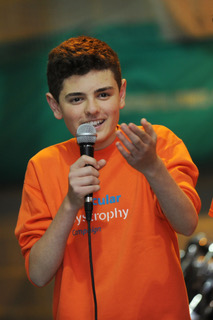
Living with muscular dystrophy is stressful enough as it is. Having a charity backing your fundraising efforts means you can actually enjoy the experience and, of course, raise even more money for vital research.
Because that’s where MDUK’s work is truly invaluable. Without research into muscle-wasting conditions, we’ve got no hope of ever finding a treatment, let alone a cure.
Giving kids with muscular dystrophy a level playing field
Growing up with muscular dystrophy hasn’t been an easy journey, but it’s one that has taught me a lot – including how to live more in the moment.
At the end of my talk at the charity golf day, I left the audience with three thoughts.
- By all means, be ambitious about the future. Set targets and work towards them. But don’t do it at the expense of your happiness right now.
- Look around and be grateful. Be grateful for the present and everything you have in it, whether that’s your health, your family, or your material possessions.
- Finally, stop for a moment, and look back. Look back and give to those less fortunate than you. Those who woke up this morning wishing that they could be in your shoes.
If anyone had actually stopped to ask that little boy in the middle of school sports day, “What would you like?”, I can tell you now, it wouldn’t have been to have lots of money, expensive cars, or fancy houses.
You could have offered me anything, and I’d have told you to keep it. All I wanted, as I lined up for that dreaded 75-metre race, was a cure or a treatment. All I wanted was that level playing field with my peers.
And the only way kids living with conditions like mine are going to be on that level playing field, is if we can fund research today to give future generations a chance. A chance at a life that people with muscular dystrophy wish they could be living.
You can read more about Jed and his family’s fundraising mission on the Thirkettle Family Fund page, ‘Team Jed’, where you can also show your support by making a donation.
If you’d like to set up a family fund of your own and raise money for people living with muscle-wasting conditions, visit our family funds page to find out more.
